

Positive Discipline Association - Grades. Question: Our 14 year old son doesn't seem to mind getting bad grades.
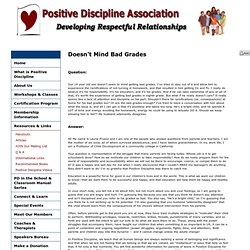
I've tried to stay out of it and allow him to experience the ramifications of not turning in homework, and that resulted in him getting Ds and Fs. I really do believe it's his responsibility. It’s his education, and it’s his grades. And if he can take ownership of any or all of that, it's worth the experience of getting bad grades in eighth grade. Answer: Hi! It is important that you don’t hope he’ll say what you want him to say, but really listen.
Positive Discipline Association - Grade Expectations. Question: I need a little advice.
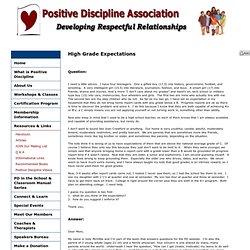
I have four teenagers. One a gifted boy (17.5) into history, government, football, and wrestling. A very intelligent girl (15.5) into literature, journalism, fashion, and boys. A smart girl (17) into friends, drama and movies. Answer: Dear Mom, My name is Jody McVittie and I’m part of the team that answers questions for the PD website. Your inner sense that “it feels kinda wrong to keep grounding them” may be close – only I wouldn’t call it “wrong” as much as less than effective (as you’ve discovered).
Before I make specific suggestions, I invite you to get into their world a little bit. Hear are some specific ideas:1. 2. 3. Dina Emser Executive Leadership Coach. Dina Emser is a founding partner of Emser International Inc. and an author, speaker and leadership coach who over the last 12 years has been providing coaching, training and consulting services to service-based small businesses, schools, and corporate executives who want to better understand and expand their leadership to increase their productivity and effectiveness.
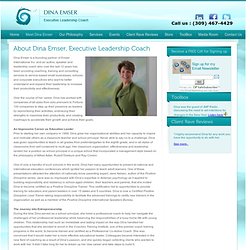
Over the course of her career, Dina has worked with companies of all sizes from solo-prenuers to Fortune 100 companies to step up their presence as leaders by reprioritizing their activities, embracing their strengths to maximize their productivity, and creating roadmaps to accelerate their growth and achieve their goals. An Impressive Career as Education Leader Prior to starting her own company in 1999, Dina grew her organizational abilities and her capacity to inspire and motivate others as a classroom teacher and school principal.
Dina resides in the Midwest with her husband of 33 years, sculptor Bob Emser. Run Your Family Like a Business. The Powerful Gift of “I Did It!” Posted by janet on Feb 8th, 2010 Hovering parents are taking a beating in the media these days.
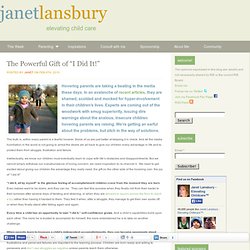
In an avalanche of recent articles, they are shamed, scolded and mocked for hyper-involvement in their children’s lives. Experts are coming out of the woodwork with smug superiority, issuing dire warnings about the anxious, insecure children hovering parents are raising. We’re getting an earful about the problems, but zilch in the way of solutions. The truth is, within every parent is a fearful hoverer. Intellectually, we know our children must eventually learn to cope with life’s obstacles and disappointments. “I did it, all by myself” is the glorious feeling of accomplishment children crave from the moment they are born.
Every time a child has an opportunity to own “I did it,” self-confidence grows. When parents learn to treasure a child’s independent accomplishments, they can become passionate about backing off rather than hovering. Praise_and_Encouragement. No More Lists of Rules: Ask Kids How They Want to Feel. Instead of starting with expectations for how students should behave, what if a school began the process of community-building by asking how students wanted to feel at school every day?
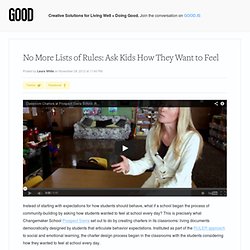
This is precisely what Changemaker School Prospect Sierra set out to do by creating charters in its classrooms: living documents democratically designed by students that articulate behavior expectations. Instituted as part of the RULER approach to social and emotional learning, the charter design process began in the classrooms with the students considering how they wanted to feel at school every day. Already equipped with a rich vocabulary of feelings and emotions from Prospect Sierra's extensive social and emotional learning curriculum, students in one fourth grade classroom broke into small groups to brainstorm and agree on a few words that described how they wanted to feel in the classroom and elsewhere at school.
Do: Create a charter with your kids or students. Free Positive Discipline Download Files.